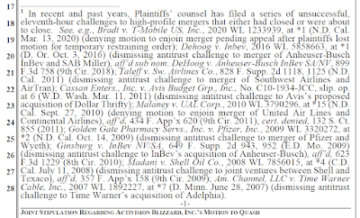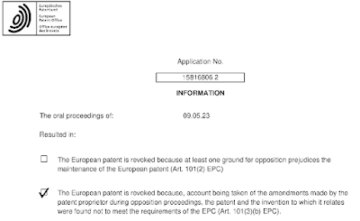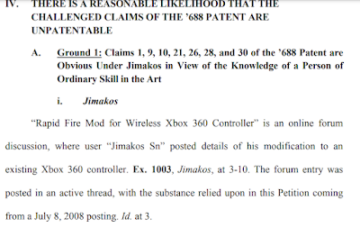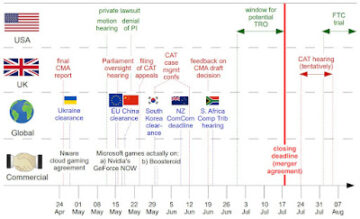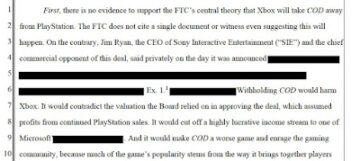מאגר הפטנטים של תקן חיוני של Avanci 5G לרכב (SEP) חשף את מרצדס בנץ כבעל הרישיון הראשון שלה חודש שעבר. היום תוכנית הרישוי הודיעה שגם ב.מ.וו הצטרפה, which takes the number of licensed brands from one to four: Mercedes, BMW, MINI, and Rolls-Royce. Today’s press release also indicates that the number of licensors has increased from 58 to 61.
By now, almost the entire automotive industry has an Avanci 4G license. But back in 2017, BMW became Avanci’s first 4G licensee. It took a while for that pool to be widely adopted. Things appear to be going significantly faster with Avanci 5G now.
In retrospect, BMW’s decision made business sense unless one believes in the illegal concept of group boycott: Mercedes (then named Daimler) and Volkswagen did not save money by opposing the Avanci model. They ended up choosing the pool license over bilateral licensing negotiations and disputes, but unlike BMW they incurred litigation expenses (in Volkswagen’s case, the dispute was short-lived and due to the fact they licensed only 3G patents for most of the cars the group makes). BMW saved money, time, and energy. They stayed above the fray.
למרות שעדיין לא ראיתי מקרה של הפרת SEP גרמני המתמקד ב-BMW, ברור שהם אינם מטרה רכה עבור מחזיקי SEP שאינם מחזיקי SEP. מיוצג בדרך כלל על ידי Bardehle Pagenberg’s Professor Tilman Mueller-Stoy (“Müller-Stoy in German), BMW is known to defend itself vigorously against patent infringement assertions, though most of the time the outcome is, obviously, a license agreement. If such a company takes a license without litigation, it must have concluded that the licensed patents are valuable.
Germany’s remaining three automotive brands are Volkswagen, Audi, and Porsche, all of which belong to Volkswagen Group. Audi and Porsche clearly compete in some of the same market segments as BMW and Mercedes. It would make a lot of sense for VW to join the pool now. Sooner or later, some 5G SEP holders will start to enforce their rights against unwilling licensees. Just like German judges pressed Mercedes (then named Daimler) to explain why a license that had been taken by their closest (and equally German) competitors: BMW and Audi. I doubt that Audi would want to have to justify–particularly in front of the same judges who heard נוקיה נגד דיימלר–a refusal to take a license that Mercedes and BMW deem to make economic sense.
בדיוק כמו שפעולות מדברות חזק יותר ממילים, עסקאות רישיון בעולם האמיתי הן הרבה יותר משמעותיות מאשר ספין דוקטור ותעמולה פוליטית. מרצדס-בנץ אמרה לאיחוד האירופי שהתקנת ה-SEP המוצעת (או משהו אפילו יותר סתמי) נחוצה מאוד, ובכל זאת הפכה לבעלת הרישיון הראשונה של Avanci 5G מכיוון שהם ראו בה זהירות. באופן דומה, קבוצת BMW היא כעת מאמצת מוקדמת של רישיון Avanci 5G, אך היא חברה בברית התקנים ההוגנים ובארגונים מסוימים בתעשיית הרכב הנוקטים בעמדות דומות.
There’s nothing difficult to understand: every company would like to bring any cost category–here, cellular SEP license fees–down, even if such costs are already fair and reasonable. Automakers are no different. That is unrelated to the merits of Avanci providing a one-stop solution that Mercedes and BMW have twice (4G and now 5G) considered superior over dozens and dozens of bilateral deals. And opportunism by some car makers certainly doesn’t make the EU proposal any less misguided. Case in point, אחת נוקיה נגד OPPO decision in Sweden (which went in the defendant’s favor) showcases at least four of the countless flaws of that bill.
Accurate and holistic analysis needs to look at what those companies say and what they do. License deals that are concluded in the absence of litigation–and presumably even without the slightest threat of litigation other than the fact that כל הפרה עשויה להפוך במוקדם או במאוחר לנושא של פעולות אכיפה.
Europe’s and particularly Germany’s automotive industry is facing undeniably large problems. Cellular SEP licensing is none of them, though. Even if those costs were reduced through political intervention (which I don’t see happening, though it is some people’s agenda), that wouldn’t help to address any of the fundamental challenges facing the European auto sector, particularly because there’s no comparative advantage for companies selling cars in a given target market in which certain patents must be licensed.
Today’s Avanci-BMW announcement is good news for those who argue that the market can and will find solutions, as are other recent license deals such as Huawei’s recent agreement with Xiaomi.
Patent pools exist to simplify licensing–which must have been the reason why BMW entered into one agreement rather than 60+ bilateral deals–while some EU officials and politicians are trying to complicate the process and mistakenly view pools as part of the problem, not part of the solution.
- הפצת תוכן ויחסי ציבור מופעל על ידי SEO. קבל הגברה היום.
- PlatoData.Network Vertical Generative Ai. העצים את עצמך. גישה כאן.
- PlatoAiStream. Web3 Intelligence. הידע מוגבר. גישה כאן.
- PlatoESG. פחמן, קלינטק, אנרגיה, סביבה, שמש, ניהול פסולת. גישה כאן.
- PlatoHealth. מודיעין ביוטכנולוגיה וניסויים קליניים. גישה כאן.
- מקור: http://www.fosspatents.com/2023/09/avanci-5g-doubles-number-of-licensees.html
- :יש ל
- :הוא
- :לֹא
- $ למעלה
- 2017
- 58
- 5G
- a
- מֵעַל
- היעדרות
- פעולה
- פעולות
- כתובת
- מאומץ
- יתרון
- נגד
- סדר יום
- הסכם
- תעשיות
- אליאנס
- כמעט
- כְּבָר
- גם
- an
- אנליזה
- ו
- הַכרָזָה
- כל
- לְהוֹפִיעַ
- ARE
- לטעון
- AS
- At
- אאודי
- המכונית
- יצרני רכב
- רכב
- תעשיית רכב
- בחזרה
- רע
- BE
- הפך
- כי
- להיות
- היה
- להתחיל
- מאמין
- הבילטרליים
- ב.מ. וו
- שניהם
- מותגים
- להביא
- עסקים
- אבל
- לַחְצָן
- by
- CAN
- מכונית
- מכוניות
- מקרה
- תאי
- מסוים
- בהחלט
- האתגרים
- בחירה
- ברור
- בבירור
- הכי קרוב
- חברות
- חברה
- להתחרות
- מתחרים
- מושג
- הגיע למסקנה
- נחשב
- עלות
- עלויות
- אינספור
- דיימלר
- דילים
- החלטה
- לִסְבּוֹר
- נחשב
- להגן
- DID
- אחר
- קשה
- מַחֲלוֹקֶת
- סכסוכים
- do
- לא איכפת
- דון
- זוגות
- ספק
- עשרות
- ראוי
- מוקדם
- כַּלְכָּלִי
- סוף
- הסתיים
- אנרגיה
- לאכוף
- אַכִיפָה
- נכנס
- שלם
- באותה מידה
- EU
- אֵירוֹפִּי
- אֲפִילוּ
- כל
- להתקיים
- הוצאות
- להסביר
- מול
- עובדה
- הוגן
- מהר יותר
- טובה
- ראשון
- פגמים
- בעד
- ארבע
- החל מ-
- חזית
- יסודי
- גרמנית
- גרמניה
- נתן
- הולך
- טוב
- קְבוּצָה
- היה
- מתרחש
- יש
- נשמע
- לעזור
- מחזיקים
- הוליסטית
- HTML
- http
- HTTPS
- i
- if
- לא חוקי
- in
- גדל
- נגרם
- מצביע על
- תעשייה
- הפרה
- התערבות
- אל תוך
- IT
- שֶׁלָה
- עצמו
- להצטרף
- הצטרף
- שופטים
- רק
- ידוע
- גָדוֹל
- אחרון
- מאוחר יותר
- הכי פחות
- פחות
- רישיון
- מורשה
- - רישיון
- רישוי
- כמו
- ליטיגציה
- נראה
- מגרש
- חזק יותר
- עשוי
- לעשות
- קובעים
- עושה
- שוק
- מאי..
- משמעותי
- חבר
- מעלות
- טועה
- מודל
- כסף
- חוֹדֶשׁ
- יותר
- רוב
- צריך
- שם
- נחוץ
- צרכי
- משא ומתן
- חדשות
- הבא
- לא
- ללא חתימה
- שום דבר
- עַכשָׁיו
- מספר
- of
- גורמים רשמיים
- ONE
- רק
- or
- ארגונים
- אחר
- תוֹצָאָה
- יותר
- חלק
- במיוחד
- פטנט
- הפרת זכויות יוצרים
- פטנטים
- אֲנָשִׁים
- PHP
- אפלטון
- מודיעין אפלטון
- אפלטון נתונים
- נקודה
- פוליטי
- פוליטיקאים
- בריכה
- ברכות
- פורשה
- עמדות
- ללחוץ
- עיתונות ופרסומים
- בעיה
- בעיות
- תהליך
- פרופסור
- תָכְנִית
- תעמולה
- הצעה
- מוּצָע
- מתן
- במקום
- עולם אמיתי
- טעם
- סביר
- לאחרונה
- מופחת
- סֵרוּב
- תקנה
- לשחרר
- נותר
- מיוצג
- גילה
- זכויות
- רולס רויס
- s
- אותו
- שמור
- הציל
- לומר
- מגזר
- לִרְאוֹת
- לראות
- מגזרים
- מכירת
- תחושה
- showcases
- באופן משמעותי
- שלטים
- דומה
- באופן דומה
- לפשט
- יחיד
- רך
- פִּתָרוֹן
- פתרונות
- כמה
- משהו
- לדבר
- לְסוֹבֵב
- תקנים
- התחלה
- נשאר
- נושא
- כזה
- מעולה
- שוודיה
- T
- לקחת
- משימות
- לוקח
- יעד
- מיקוד
- מֵאֲשֶׁר
- זֶה
- השמיים
- שֶׁלָהֶם
- אותם
- אז
- שם.
- הֵם
- דברים
- אלה
- אם כי?
- איום
- שְׁלוֹשָׁה
- דרך
- זמן
- ל
- היום
- אמר לי
- לקח
- מנסה
- פעמים
- בדרך כלל
- ללא עוררין
- להבין
- אלא אם כן
- בניגוד
- בעל ערך
- לצפיה
- פולקסווגן
- קבוצת פולקסווגן
- vw
- רוצה
- היה
- דֶרֶך..
- הלכתי
- היו
- מה
- אשר
- בזמן
- מי
- למה
- באופן נרחב
- יצטרך
- עם
- לְלֹא
- מילים
- היה
- לא
- עוד
- זפירנט


